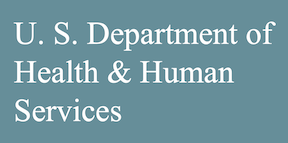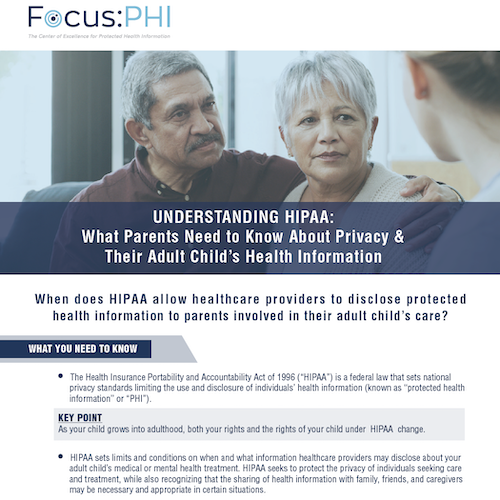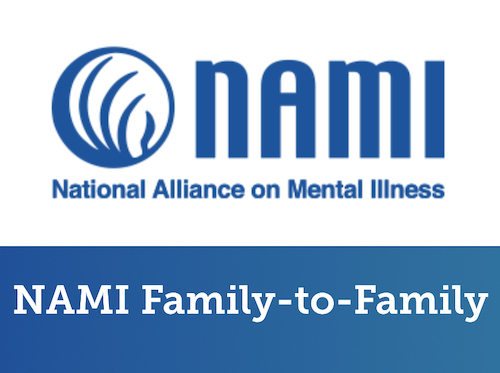
Resources
HIPAA for Caregivers is for people who are taking care of a loved one who is facing mental health challenges. On this page, we present three categories of resources that support the information offered by this website and help your family, in general.

Resources about HIPAA and other federal privacy rules from the United States Department of Health & Human Services
Explore the highly-detailed original source materials we used in writing the HIPAA facts in the Home and FAQs pages.

Other products and web pages relating to HIPAA and patient privacy
Funding from U.S. government grants resulted in some of these resources. And, the rest come from nonprofits focused on mental health, funded through other means.

Family Education
General information from nonprofits founded to help families like yours
These resources teach you how to help your loved one and your family. Both patients and caregivers are impacted by mental health conditions.
United States Department of Health and Human Services (HHS), Office of Civil Rights
All the resources about HIPAA from HHS is in their webpages about Health Information Privacy. You might think to logically go to the section, “For Individuals.” However, those pages are written for patients.
Instead, caregivers should look in HIPAA For Professionals. Professionals, here, refers to the folks who must follow HIPAA. Mainly, that’s health care providers. Not surprisingly, there is a lot of information in those pages about when providers can talk with families.
Summary of the HIPAA Privacy Rule
HHS > HIPAA Home > For Professionals > Privacy > Summary of the HIPAA Privacy Rule
This webpage contains a lot of text that sums up the Privacy Rule.
Guidance
HHS > HIPAA Home > For Professionals > Privacy > Guidance Materials
This webpage contains guidance for health care providers about the Privacy Rule. As a result, it has links to at least three pages of direct interest to caregivers:
1. The Guidance on Significant Aspects of the Privacy Rule webpage contains a link to information on Incidental Uses and Disclosures (webpage).
2. Fast Facts for Covered Entities (webpage)
HHS > HIPAA Home > For Professionals > FAQ > Disclosures to Family and Friends
This webpage contains many questions and answers about when health care providers can disclose patient information to family and friends.
Preemption of State Law
HHS > HIPAA Home > For Professionals > FAQ > Preemption of State Law
The webpage contains the specific FAQ “Does the HIPAA Privacy Rule preempt state laws?“
Joint Guidance on Application of HIPAA and FERPA to Student Health Records
This webpage specifically addresses HIPAA and FERPA, linking to a pdf on the subject.
Mental Health & Substance Use Disorders
This webpage contains links to the main body of documents useful to you. They are:
1. HIPAA Helps Caregiving Connections (downloadable PDF)
2. When Can I Obtain Information about my Loved One? (downloadable PDF)
4. Am I my Child’s “Personal Representative” under HIPAA? (downloadable PDF)
6. HIPAA Privacy Rule and Sharing Information Related to Mental Health (downloadable PDF)
8. How HIPAA Allows Doctors to Respond to the Opioid Crisis (downloadable PDF)
United States Department of Health and Human Services (HHS), Substance Abuse and Mental Health Services Administration (SAMHSA)
SAMHSA produces information about privacy rules when substance use is involved. In these situations, sometimes HIPAA applies. Other times, another federal regulation – 42 CFR Part B – applies.
The Confidentiality of Alcohol and Drug Abuse Patient Records Regulation and The HIPAA Privacy Rule: Implications for Alcohol and Substance Abuse Programs.
Substance Abuse Confidentiality Regulations
(SAMHSA) Home > About Us > Who we are > Laws and Regulations > Confidentiality FAQs
Additional products relating to HIPAA and patient privacy

Deep information about HIPAA written for parents/caregivers of loved ones with mental health conditions, produced by grants from SAMHSA
Two SAMHSA grant programs worked together to write this in-depth resource for you (2021). First, the Center of Excellence for Protected Health Information (COE-PHI) took the lead in creating the document. Then, they reached out to the National Family Services Technical Assistance Center (NFSTAC) for valuable input and review. SAMHSA is the Substance Abuse and Mental Health Services Administration, a branch of the U.S. Department of Health and Human Services.
Family Education Resources

Family-to-Family course from the National Alliance for Mental Illness (NAMI)
We can’t say enough good things about the National Alliance on Mental Illness (NAMI) and, more specifically, their Family-to-Family course. This is their flagship effort for helping families (caregivers) understand what is happening with their loved one who is struggling with mental health. In addition to this course, which is the same everywhere, NAMI’s local chapters offer a variety of support groups. Their website has a tool to help you find their nearest chapter.
